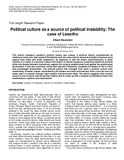Political culture as a source of political instability: the case of Lesotho

View/
Date
2010-04Author
Maundeni, Z.
Publisher
Academic Journals, http://www.academicjournals.orgType
Published ArticleMetadata
Show full item recordAbstract
This article considers Lesotho’s political history and culture, a political history characterised by rebellious chiefs who had rejected Christianity and who were heavily armed and fought numerous wars against their black and white neighbours. Its argument is that the state’s dysfunctionality in small Lesotho is a result of a political culture and history of armed resistance, producing rebellious political
elites who feuded between themselves, against the colonial establishment and against the postcolonial government. It was also a political culture that rejected Christianity, accepted old leaders to die in office and encouraged factionalism. The political parties that emerged from such a political culture were traditionally oriented, radical, dominated by old leaders and were factionalised. Such a society was not
easily open to renewal through fresh leaders and borrowed ideas. The article suggests that Lesotho need to come to terms with its political history and to come up with a cultural re-orientation away from traditionalism, rebellion and factionalism.
